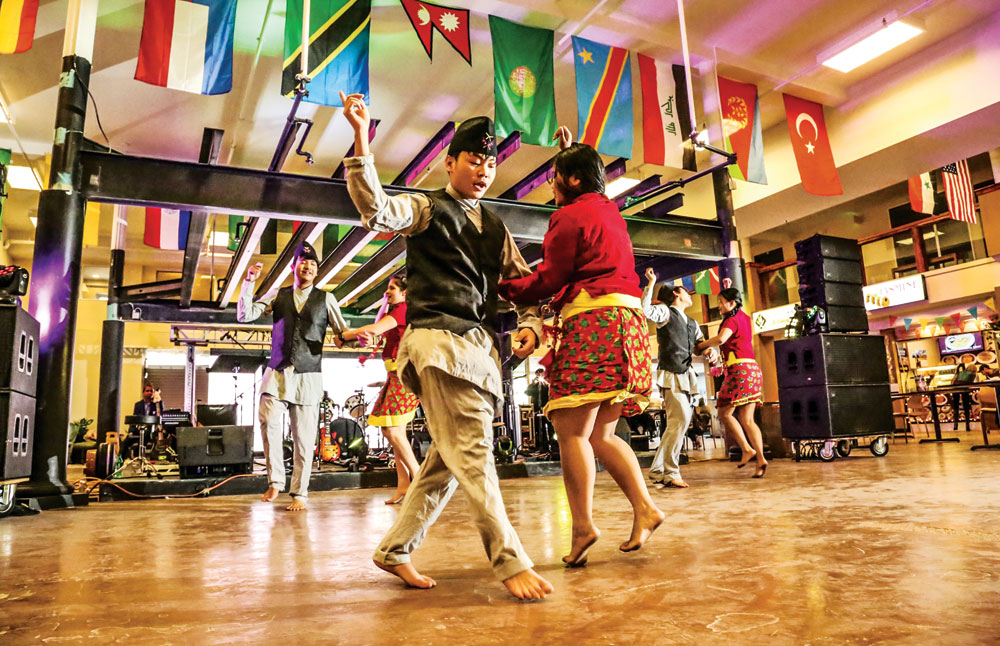
Dancers celebrate the Nepali New Year at an April 13 festival at Mango House.
What started in 2012 primarily as a medical practice for resettled refugees has grown into an ethnic marketplace at 10180 E. Colfax Ave. A six-stall food court is now open, operated by refugees cooking foods from Burma, Sudan, Syria, Nepal and Somalia.
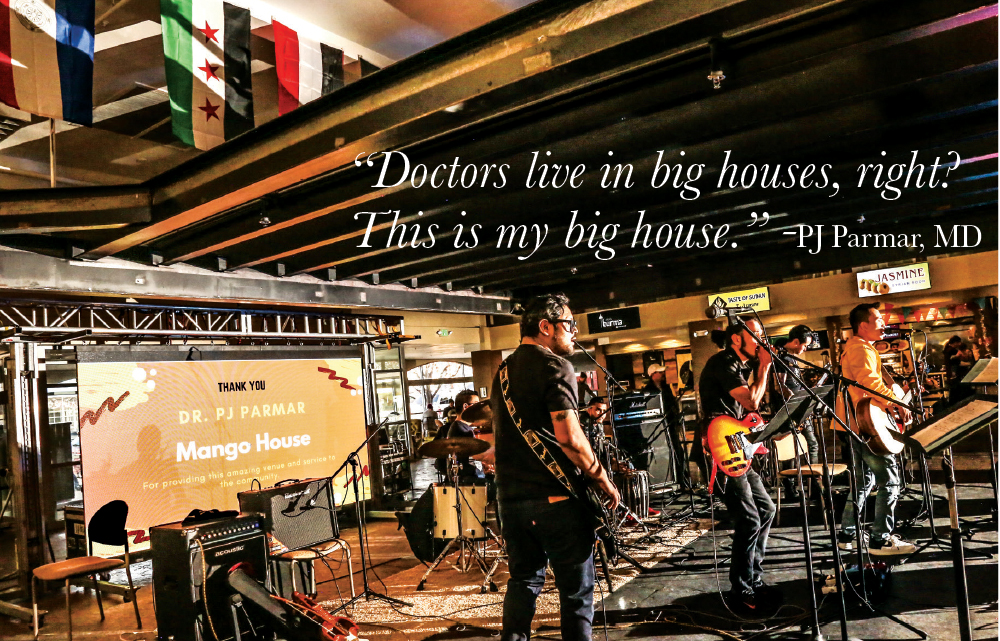
During a Nepali New Year’s festival on April 13 at Mango House, a full screen thank you to Dr. PJ Parmar stood out among the images in the slide show.
Dr. PJ Parmar laughs as he looks around Mango House, located in a 56,000 square foot building at 10180 E. Colfax that used to be a JC Penney’s. Mango House, now the home of six food-court style restaurants, offers ethnic dining you won’t find under one roof anywhere else in metro Denver.
Parmar knew while in medical school that he wanted to care for people who are underserved—and in 2012, he opened a private practice to exclusively serve refugees. Since then, he has seen over 50,000 patients, 90% of whom are on Medicaid. Though many doctors accept few, if any, Medicaid patients, through innovation and efficiency, he has created a profitable practice that is responsive to the needs of refugees.
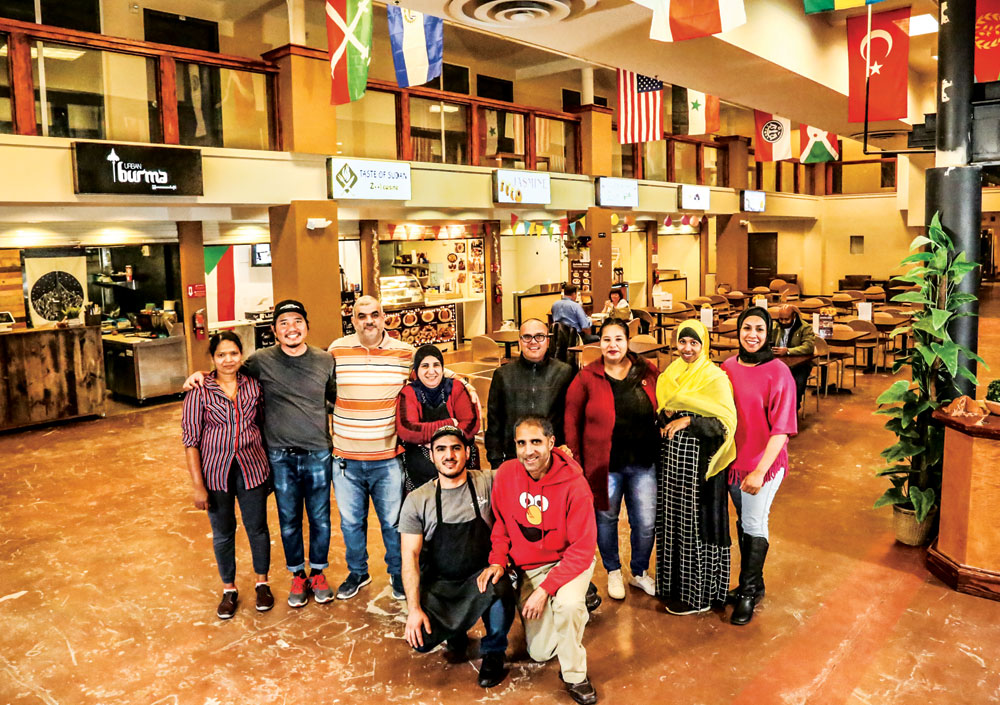
Mango House, located in a former JC Penney store on East Colfax in Aurora, now has a food court with six ethnic restaurants, most owned by refugees. Back row, from left: Urban Burma – Tin Tin Aye and owner Siri Tan; Jasmine Syria Middle Eastern Restaurant – the Alnouri family, with Mohamad Alnouri at left in the front row; Nepali Mountain Kitchen – Dharani Dhakal and Sarda Siktel; Ayny’s Kitchen Bakery Café – Aine Mohamed Aweis; Taste of Sudan – Sara Hamid; not open at the time of the photo, Golden Sky Sushi. Dr. PJ Parmar is at right in the front row.
In July 2018, Parmar took on a $3.7 million mortgage to turn the former JC Penney building at Colfax and Galena in Aurora into a marketplace where refugees can operate their own businesses, get medical, dental and other services, and have a place for community events. Parmar guided months of renovation and city inspections—and now some of these resilient and hard-working entrepreneurs are happily sharing their food and their stories with neighbors in their new country.
For more information, check the Mango House website at http:// 1532galena.com. Hours for each stall are different and evolving as the businesses grow. The sixth restaurant, Golden Sky Sushi, has not yet opened.
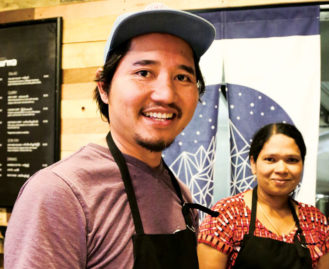 Urban Burma
Urban Burma
Siri Tan, whose friend Tin Tin Aye works for him, is proud to have opened the first Burmese restaurant in Denver. “I want to introduce Burmese food to my new Denver neighbors,” said Tan. But Tan’s journey from his childhood in Burma to restaurant owner had a few detours. After leaving his home in 2007, Tan lived in Thailand for seven years working for a non-profit, helping his fellow Burmese refugees. He met his American wife there, and together the two came to Denver in 2014.
In the U.S.,Tan continued working in the non-profit sector, but dreamed of owning his own restaurant. When Parmar first showed him the food stalls, Tan left his job to drive for Lyft and save money to cover the initial investment. His brother, who currently lives in Oklahoma, is a co-investor. Tan hopes he will move to Denver soon and join the business full-time.
Tan’s goal is to serve healthy, flavorful food that is affordable to all. The menu includes curry and noodle dishes, which he serves alongside spicy sauces. He proudly tells of a family that drove over 30 minutes to get to his restaurant. “They had eaten Burmese food 10 years ago in San Francisco and came as soon as they heard there was a Burmese restaurant in Denver.”
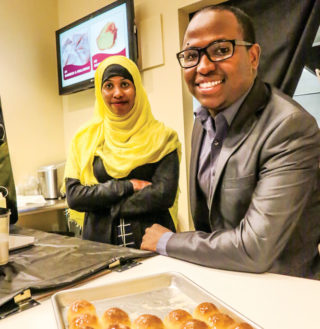 Ayny’s Kitchen Bakery Cafe
Ayny’s Kitchen Bakery Cafe
Aine Mohamed Aweis and her husband Fauzy Ali Sayid are both survivors of Somalia’s civil war and a traumatic border crossing into Kenya. Sayid, who walks with a brace due to polio, escaped to Nairobi when he was a child, while Aweis arrived in her teens. Sayid came to Denver on an immigrant visa in 2012. He subsequently met his wife in Nairobi and brought her to the United States. Though the couple has three young children, when the opportunity to open their own restaurant presented itself, they knew they had to take it.
The business was Aweis’ idea. “She always used to be invited to friends’ weddings to cater the food and just put a lot of sweets on the table,” said Sayid. In September 2018, she started baking in a shared commercial kitchen and selling her goods to Somali-owned stores, but longed to expand her business.
The new restaurant serves pastries and Somali cakes alongside samosas and rice with chicken. The couple’s goal is to continue to add menu items, expand their baked goods selection, and eventually hire additional staff. “We want you to stop by,” said Sayid. “We definitely have a variety of food to teach people about.”
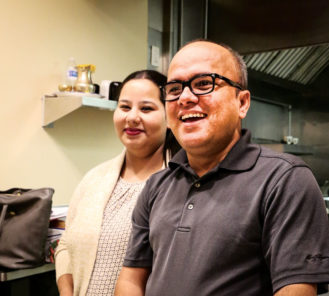 Nepali Mountain Kitchen
Nepali Mountain Kitchen
Husband and wife Dharani Dhakal and Sarda Siktel’s new food stall strives to introduce Nepali food to the Denver community. The name Nepali Mountain Kitchen is an homage to Dhakal’s love for the mountains, both in Nepal and Colorado. Dhakal, who can speak nine languages, left Bhutan at age five or six, and lived in a refugee camp in Nepal for over 25 years. After getting a scholarship to study in India, where he met his wife, he had the chance to follow his parents and settle in the U.S. in 2014.
Siktel and Dhakal are delighted to have the opportunity to showcase Nepali cuisine. “We serve food that is Nepali, ethnic and good,” said Dhakal. “Everything we are selling is grandma’s recipe. A recipe from the home.” Specialties include chicken curry served Nepali style and Dal-Bhat Tarkari, a lentil and rice dish. The menu also includes several vegetarian options.
The couple has a one-month-old baby girl and a 12-year-old son. Siktel’s parents are visiting from India to help with the baby as they turn their restaurant aspirations to reality. Dhakal has big dreams—he hopes to one day open other Nepali Mountain Kitchen locations in cities across the U.S.
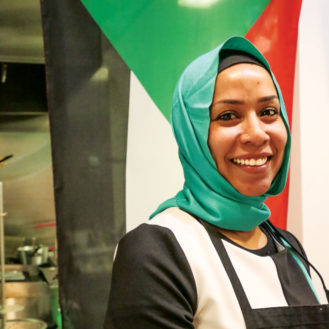 Taste of Sudan
Taste of Sudan
Owner Sara Hamid came to the U.S. as an immigrant in 2009, following her husband who is Sudanese but an American citizen. She has a passion for cooking and holds degrees in both food science and human nutrition. Last year, she decided she wanted to be more involved in the community—so when Parmar approached her with his food hall idea, she knew it would be a perfect fit.
Hamid’s restaurant serves things she loves alongside items that are pure Sudanese. Agashe, a traditional Sudanese treated meat, is only available locally at her food stall. Hamid also offer family-style meal options.
Hamid said things have gotten worse in Sudan since she left, and she sends much of her profit back home to support her family. She is hopeful her restaurant will teach people about her homeland and its food. “I would like them to feel what we feel back home and sit down and eat together. Having that group of people that can share the same plate together, talk and sit down for a long time. It’s better than Facebook, or your cell phone, or your computer.”
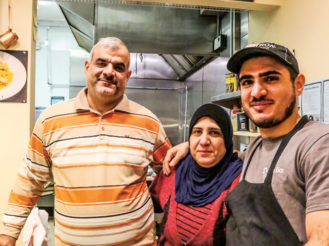 Jasmine Syrian Food
Jasmine Syrian Food
The Alnouri family emigrated from Syria to Colorado just two years ago. Following the Arab Spring, they spent five years in Egypt before being granted refugee status. Son Mohammed immediately enrolled in classes to learn English. Soon after, he participated in the University of Denver’s food safety program and began working in a restaurant downtown. He quickly worked his way up to a position as a chef, which was when he first dreamed of opening his own place. In February, just two years after he arrived in the U.S., his dream became a reality.
Today, Mohammed continues to hold down two jobs, working at the downtown restaurant in the mornings and at Jasmine Syrian Food well into the night. He says he works as hard as he does for his parents. “I have to do this for them because they protected me when I was a child.”
The restaurant serves traditional Syrian food, made fresh each day using family recipes. The menu includes tabbouleh, falafel, and shwarma. Mohammed hopes his restaurant will “help people know us, to know the Syrian people. And I hope to make my parents proud of me.”
Golden Sky Sushi
Khaing Tun and Htwe Aung, who are Rakhine refugees from Burma, will be opening soon.




This article introduced us to Mango house and now we are big fans of Urban Burma! The Shin noodle dish and the tea leaf salad are great!
I can’t wait to get back to aurora and try these places. I love food and I like to hear people’s stories.